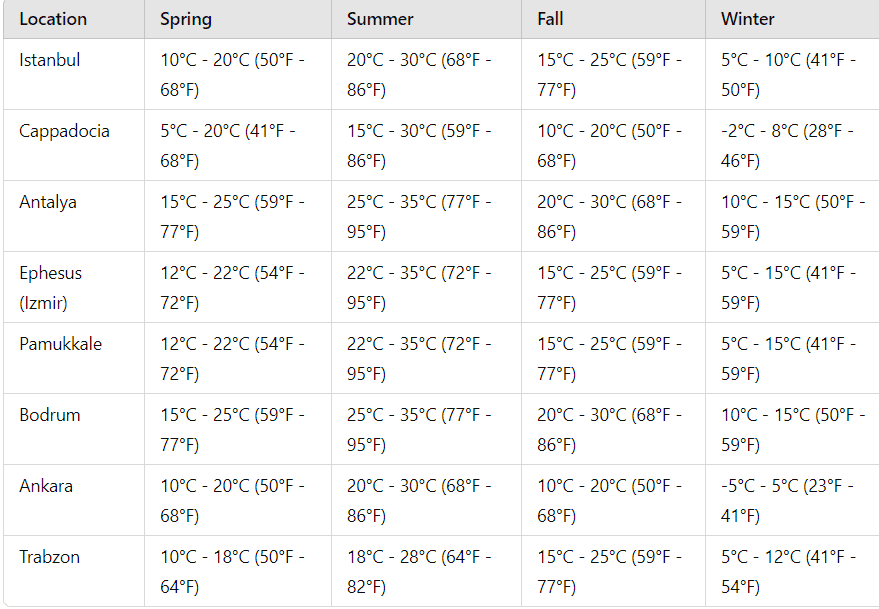Before Your Trip to Turkey
The Weather in Turkey
Summer in Turkey can be quite intense, with temperatures often reaching 100°F (38°C). It’s still a great time to visit if you prepare properly for the heat. Make sure to bring UV umbrellas, sunscreen, and stay hydrated. However, some places, like Ephesus and Cappadocia, can feel unbearably hot between 12 PM and 5 PM during peak summer.
Winter can bring cold weather and snow to certain areas, and it’s considered the low season for tourism, running from November through March.
Spring is a wonderful time to visit, as everything is in full bloom and the weather is pleasant without being too hot. April and May are ideal months to explore Turkey.
Fall, particularly September and October, is another excellent time to visit. The weather remains warm, but the crowds are smaller, and temperatures are generally mild across the country.

How to Dress in Turkey?
Turkey is incredibly diverse in its topography, politics, and culture. You might see a woman in a stylish dress, only to turn a corner and encounter another woman with everything but her eyes covered. This diversity is mirrored in different parts of the country. For instance, places like Konya are more conservative, while cities like Bodrum feel more relaxed and cosmopolitan. Even within Istanbul, neighborhoods vary greatly: trendy Kadıköy offers a youthful, creative vibe, while the historical Sultanahmet district is rich with museums, markets, and centuries-old architecture.
When packing for Turkey, it’s wise to bring a mix of conservative and casual clothing. This allows you to adapt to the cultural norms of different areas and feel comfortable wherever you go. Pack light, breathable clothes for warmer, more liberal areas and more modest attire for regions where a conservative dress code is appreciated.
Seasonal Considerations
Summer

During the summer months in Turkey, the heat can be intense, especially in places like Antalya where temperatures can soar up to 40°C accompanied by high humidity. Sleeveless tops and shorts are generally acceptable to stay cool, but it’s advisable to choose styles that are modest and not overly revealing. However, keep in mind that not all regions of Turkey experience such extreme heat, so dress according to the specific climate of your destination.
Fall
Fall in Turkey brings a mix of temperatures, with warm days and cooler evenings. Layering is key to adjust to these fluctuations throughout the day. It’s interesting how the sun can make daytime feel warmer than it actually is, while evenings tend to cool down noticeably. Additionally, fall tends to be rainier than spring, so having a good quality raincoat handy is advisable to stay dry during occasional showers.
Winter
Winter in Turkey is typically the wettest season, characterized by varying temperatures depending on your location. Coastal areas generally experience milder winters compared to inland regions, where temperatures can drop significantly. Packing warm clothes is essential, along with a sturdy raincoat to cope with frequent rainfall. Whether you’re exploring coastal cities or venturing inland, being prepared for chilly and wet conditions will ensure a comfortable winter experience in Turkey.
Spring
Spring in Turkey offers moderate temperatures with gradual warming throughout the season. It’s ideal for exploring outdoor attractions with comfortable, mild days and cooler mornings and evenings. Layering is recommended for fluctuating temperatures, and packing lightweight, breathable clothing like cotton and linen ensures comfort. Be prepared for occasional showers with a compact umbrella or waterproof jacket. Remember to respect local customs by dressing modestly in conservative areas or when visiting religious sites. Overall, spring in Turkey provides a pleasant transition from winter to summer, perfect for diverse outdoor activities and cultural exploration.
The Currency in Turkey
Turkey operates using the Turkish lira (TRY or ₺) as its official currency. For travelers heading to this vibrant destination, knowing how to manage currency exchanges is crucial.
Which Currency Can Tourists Use in Turkey?

While some businesses in tourist areas might accept Euros or US Dollars, the Turkish lira is the widely preferred currency for transactions. It’s recommended to have lira on hand to avoid any inconvenience, especially in more local or non-touristy establishments.
Where to Exchange Money in Turkey
Tourists can exchange their currency into Turkish lira at several locations:
Banks: Most banks in cities and towns offer currency exchange services. They provide reliable rates and are generally a secure option.
Authorized Exchange Offices: These offices are also available in urban areas and offer competitive rates. They are convenient for travelers needing to exchange cash.
ATMs: Foreign visitors can withdraw Turkish lira directly from ATMs using their international debit or credit cards. This method is convenient and ensures access to local currency as needed.
Tips for Exchanging Money in Turkey
Avoid Airports and Tourist Resorts: Exchange rates at airports and tourist resorts are often less favorable. It’s better to exchange money in urban centers where rates are typically more competitive.
Check Exchange Rates: Before exchanging money, it’s wise to compare rates offered by different banks or exchange offices to get the best value.
Understanding these currency exchange options will help ensure a hassle-free and financially efficient experience while traveling in Turkey.
The Language in Turkey
English is not widely spoken in Turkey, especially outside of major tourist areas and cities like Istanbul or Antalya. In more rural regions and smaller towns, you might find it challenging to communicate in English. This can make daily activities, such as ordering food, asking for directions, or even shopping, a bit tricky. Learning a few basic Turkish phrases can be incredibly helpful and is often appreciated by locals. Carrying a phrasebook or using a translation app can also ease communication barriers.
In tourist hotspots, you’ll find more people who speak English, particularly in hotels, restaurants, and shops catering to visitors. However, it’s still beneficial to have some knowledge of Turkish or visual aids to ensure smoother interactions. Being patient and using gestures can also help bridge the language gap, making your experience in Turkey more enjoyable.
The Necessary Documents and Emergency Contacts
Visa and Passport
Obtaining a visa for Turkey depends on the nationality of the visitor. Some countries’ citizens can enter Turkey without a visa, while others need to apply for one. It is recommended to check with the consulate of your home country for specific visa requirements. Additionally, ensure that your passport is valid for at least six months beyond your planned departure date to avoid any issues. Always verify your passport’s expiration date before making travel arrangements to Turkey.
Travel Insurance
You must have travel insurance with a minimum medical, evacuation and repatriation coverage of US$50,000 covering all applicable dates of travel with the Tour Operator. This insurance must cover personal injury and emergency medical expenses. On the first day of each Tour, a representative of the Tour Operator will verify that you have sufficient insurance in place. You are strongly recommended to extend your coverage to include cancellation, curtailment, and all other expenses that may arise as a result of loss, damage, injury, delay or inconvenience while traveling. You acknowledge that insurance coverage is not included in the cost of any Tour offered by the Tour Operator, and you are required to obtain separate coverage at an additional cost. It is your responsibility to ensure that you have sufficient coverage and comply with the terms of the applicable insurance plans. You are responsible for advising your insurer of the type of travel, destination(s) and activities included in your booking so that the insurer may provide appropriate coverage.
Travel Vaccines for Turkey
Entering Turkey does not require specific vaccinations for travelers. While there are no mandatory vaccines, it is recommended to stay up-to-date with routine vaccinations such as measles, mumps, rubella (MMR), diphtheria, tetanus, pertussis (DTaP), and influenza. Depending on your travel plans, additional vaccines like hepatitis A, hepatitis B, and typhoid might be advised. Always consult with your healthcare provider for personalized medical advice before traveling.
Essential Emergency Numbers in Turkey
When visiting Turkey, it is important to be aware of the emergency contact numbers for your safety and peace of mind. Here are the key emergency numbers you should know:
Police: Dial 155 for any police assistance. They can help with issues ranging from theft to lost property.
Ambulance: Dial 112 if you need medical assistance or an ambulance. This number is crucial for any health emergencies.
Fire Department: Dial 110 in case of a fire or related emergencies. The fire department can handle various types of fire incidents.
Vegetarian, Vegan and Gluten-free Eating in Turkey

Finding vegetarian dishes in Turkey is quite easy. The cuisine offers a variety of vegetable-based dishes, including mezes, salads, and stuffed vegetables. However, as a vegan tourist, you might face some challenges. Many traditional dishes include dairy products, so it’s important to communicate your dietary restrictions clearly. Additionally, if you have a gluten allergy, navigating Turkish cuisine can be difficult. Bread and wheat-based foods are staples in many meals, making it essential to seek out gluten-free options and specify your dietary needs to restaurant staff.
Ensure you have these numbers saved in your phone and keep them handy during your travels. Knowing these can make a significant difference in critical situations and ensure you receive prompt help when needed. Enjoy your trip to Turkey with the assurance that you are prepared for any emergency.
Do’s and Don’ts in Turkey
Do’s
- Dress modestly in conservative areas. When visiting mosques, if you are a woman, cover your head and do not expose your shoulders.
- Before entering a mosque, remove your shoes or sandals.
- Accept food and drink at the invitation of locals.
- Be wary of taxi drivers who are too friendly.
- If you initiated a meal invitation, you should pay for the entire meal. In Turkey, splitting the bill after inviting someone is considered rude.
Don’ts
- Don’t wear your shoes inside a house.
- Avoid obscuring a praying person’s view.
- Do not disrespect Ramadan customs.
- Don’t disrespect Kemal Ataturk (The Father of the Turks) or Turkish Flag.
- Do not overindulge in alcohol.
- Don’t mind people Smoking At The dinner table
- Don’t buy stuff without bargaining
What to Pack for Turkey?
Travel Adapter for Turkey
In Turkey, you’ll need a type F power plug socket, which has a standard voltage of 220V. It’s essential to bring a compatible travel adapter from home to ensure your electronics work smoothly. While you can purchase basic converters locally for around $1.50, they often prove to be uncomfortable and unreliable. It’s recommended to bring one from home.
Wifi Access and Mobile Connectivity in Turkey
Getting online in Turkey can be a bit challenging for foreign travelers. Many public WiFi spots, including those at Istanbul Airport, require a European or Turkish phone number to receive an access code. This can be problematic if you need to use the internet to obtain your online visa upon arrival.
To stay connected, consider getting an international phone plan before your trip or purchasing a Turkish SIM card once you arrive. If you opt for a Turkish SIM card, remember to bring a SIM card ejector tool to switch out your current SIM card. Alternatively, for newer phones (around 2020 onwards), you might have the option to use an eSIM. This digital SIM can be downloaded directly onto your phone, eliminating the need to physically change SIM cards. This can be a more convenient solution for maintaining connectivity during your travels in Turkey.
Another option for staying connected in Turkey is to rent a portable WiFi device. These can be conveniently ordered online and delivered to your hotel or accommodation, although someone will need to be available to accept the delivery.
In your Suitcase
- Modest Attire, Long pants or skirts, scarves and shirts with sleeves for visiting religious sites.
- Lightweight Clothing, For warm weather, including T-shirts, shorts, and summer dresses.
- Layers, Sweaters or jackets for cooler evenings or mountainous regions.
- Swimwear, For coastal areas and hotel pools.
- Comfortable Walking Shoes, Essential for sightseeing and exploring.
- Sandals, For warmer weather and beach outings.
- Hiking Boots, If you plan on outdoor adventures.
- Toiletries, Including toothpaste, toothbrush, shampoo, and conditioner.
- Insect Repellent, To protect against bugs.
- Travel-Size Detergent, For laundry on-the-go.
- Electronic Devices, Smartphone, camera, chargers, and adapters.
- Health Essentials, Vitamins and probiotics to stay healthy.
- Small Travel Pillow, For comfort during long journeys or breaks.
In your Daypack
- Hand Sanitizer, For maintaining hygiene.
- Prescription Medications, Any necessary medical supplies.
- Power Bank, For charging devices on-the-go.
- Travel Documents, Passport, visa (if required), and travel insurance documents.
- Sun Protection, Sunglasses, sunscreen and a sunhat.
- Light Jacket, In case it gets chilly or if there’s unexpected weather.
- Camera, For capturing memorable moments.
- Collapsible Walking Stick, Support for hiking or uneven terrain.










